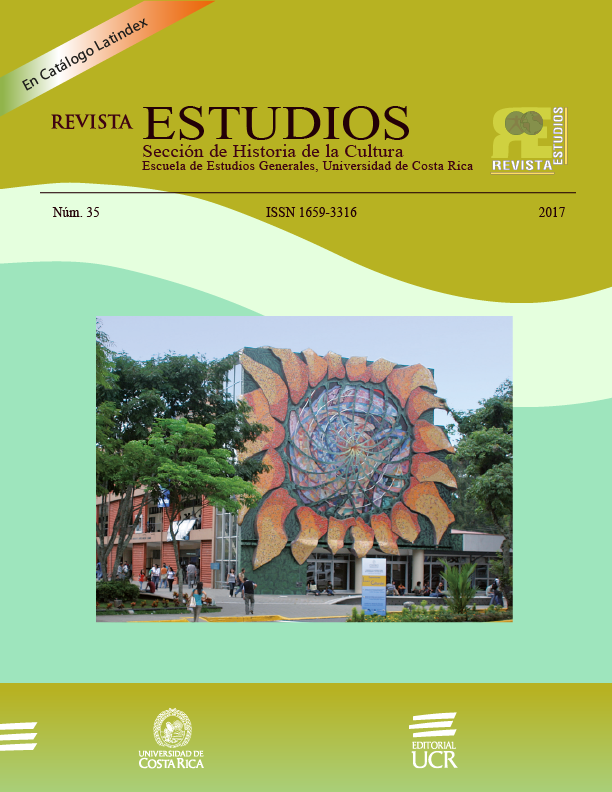Abstract
The Political Constitution of Costa Rica establishes that Catholicism is the religion of the state (article 75), turning this country into the only remaining confessional state in Latin America. However, a century ago the relationship between the Church and the Costa Rican State was very different: At the end of the 19th Century, Costa Rica became into one of the first Latin American countries that legalized the divorce and excluded religion from public schools. In order to explain this turn, the article distinguishes three periods in the secularization of the Costa Rican State from 1884 to 2016. The first period begins with the Reform and the anticlerical laws imposed by Liberal governments after 1884. The second period begins with the alliance between the Costa Rican government and the Catholic hierarchy after 1940. Finally, the third period begins in 2009, when a group submitted a bill to eliminate the Confessionality of the Costa Rican state. Following Peter Berger’s conception of desecularization, the article reveals how the secularization process of the Costa Rican state has never been a linear or progressive process. By the contrary, it shows how the Costa Rican process of secularization has been complicated, with advances and retreats.
References
Arguedas, G. (2011). El (aún) tortuoso camino hacia la emancipación: fundamentalismos religiosos, los derechos humanos de grupos históricamente oprimidos y la lucha por un Estado laico en Costa Rica. Anuario del Centro de Investigación y Estudios Políticos, 1, 49-64.
Asamblea Legislativa de la República de Costa Rica (2009). Proyecto de Ley # 17.511: reforma de los artículos 75 y 194 de la Constitución Política. Recuperado el 23 de agosto de 2017 de http://www.asamblea.go.cr/sil_access/ver_texto_base.aspx?Numero_Proyecto=17511
Blanco, R. (1984). 1884 El Estado, la Iglesia y las reformas liberales. San José: Editorial Costa Rica.
Cortés, A, (2013, enero-junio). La educación religiosa en Costa Rica. Aproximaciones teóricas del campo religioso posteriores al voto de la Sala Constitucional. Revista Espiga, 25, 97-119.
Díaz-Arias, D. (2010, mayo-agosto). ¿Una Contra-reforma tropical? Estado, religión y lucha política en Costa Rica, 1940-1949. Revista Senderos, 96, 135-162.
Fuentes, L. (2014). El cristianismo en la matriz política del Estado. Laicidad y autonomía reproductiva en Costa Rica y Nicaragua. Anuario de Estudios Centroamericanos, 40, 11-36.
Fonseca, A. (2008). Pecado y delito en la mentalidad costarricense (un estudio filosófico). Tesis para optar al grado de Magister Philosophiae. San José: Universidad de Costa Rica.
Karpov, V. (2010). Desecularization: A Conceptual Framework. Journal of Church and State, 52 (2), 232-270. Recuperado el 6 de junio de 2016 de http://www.jstor.org/stable/23921866
Molina, I. (2007, agosto). Educación y sociedad en Costa Rica: de 1821 al presente (una historia no autorizada). Diálogos. Revista electrónica de la
Escuela de Historia, 8 (2). Recuperado el 23 de agosto de 2017 de http://www.redalyc.org/pdf/439/43913793007.pdf
Picado, M. (1993). Los concordatos celebrados entre los países de Centro América y la Santa Sede. Revista de Historia, 28, 207-232.
Pollack, D. (2008). Religious Change in Europe: Theoretical Considerations and Empirical Findings. Social Compass, 55 (2), 168-186. Recuperado de http://journals.sagepub.com el 26 de agosto de 2015.
Sistema Costarricense de Información Jurídica (s.f.). Constitución Política de la República de Costa Rica. Recuperado el 24 de agosto de 2017 de http://www.pgrweb.go.cr/scij/busqueda/normativa/normas/nrm_texto_completo.aspx?param1=NRTC&nValor1=1&nValor2=871&strTipM=TC
Vargas, C. (1991). El liberalismo, la Iglesia Católica y el Estado en Costa Rica. San José: Guayacán.

